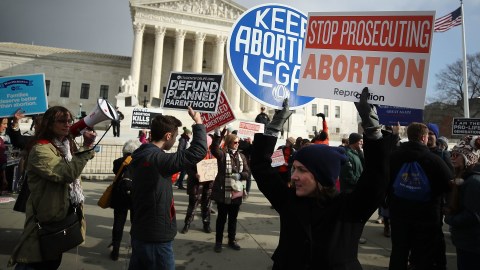Should a fetus be a citizen? Why many pro-lifers say no.

Mark Wilson/Getty Images
- Abortion rights in the United States might be in for a bit of a reduction.
- Many of the debates around abortion center around what rights, if any, a fetus should have.
- If a fetus is a person, the question of if it would be a citizen seems quickly comes to mind.
With the recent spike in laws limiting abortion access in the United States recently, the debate over the future of abortion has been rekindled with a newfound seriousness. There is reason to believe that abortion rights may soon be reduced across the nation. Some of you will be elated to read that, others nauseated.
The question of what rights a fetus would be entitled to in a society where abortion is abolished is an important one, as it can have a significant impact on our debate. Today, we’ll look at one part of that question. Specifically, if a fetus is deemed a person, would it also have citizenship?
Fetal Citizenship?
If a person is a person from the moment of conception onward, then why wouldn’t they have citizenship rights granted to them right away? That seems like the intuitive line of thinking. Indeed, persons who have no citizenship, “stateless persons” as they are known, run into endless legal issues as a result of their status. Shouldn’t this be prevented if a fetus is a person?
The question can quickly lead one down a rabbit hole of potentialities. Would a child conceived on American soil become an American? What if the parents were foreigners?
There is a surprising lack of information on this subject. Luckily, I was able to speak with Mr. Mike Gonidakis, the President of Ohio Right to Life, who was able to explain that I wasn’t just looking in the wrong places.
He told me that the question of fetal citizenship “isn’t on the radar” for any mainstream right to life organization and that over the past several years of working nothing of the kind had ever been so much as been proposed.
“Over the last 10 years we haven’t introduced or seen any introduction of such a bill,” he told me, in reference to legislation that would make the unborn citizens. I was left with no doubts as to the pragmatic motivation behind the lack of concern with the citizenship question by our conversation. As he explained, making it so the census counts the unborn would do little, in his eyes, to lower abortion rates by itself.
So, if a fetus is supposed to be a person but doesn’t have the same rights as other people, like citizenship, how does that work out?
As Mr. Gonidakis said, the concern of many pro-lifers is limited to protecting the unborn, not giving them the same rights as those who are born.
The idea that a fetus could be given rights without those rights being the same rights as are held by other people is not without precedent in the philosophy of rights. Several systems of human rights don’t quite manage to give every human being the same rights despite their best efforts.
For example, James Griffin developed a system of human rights that is based around the human capacity for “normative agency,” our ability to devise and act on a plan for our lives. He argues in his book that this means those with normative agency should have certain rights to liberty, autonomy, and welfare.
However, critics have pointed out that some humans don’t have normative agency. Young children, those in vegetative states, the severely mentally disabled, and the senile, would be prime examples. In response, he bites the bullet and agrees that these individuals lack “human rights” but still have rights for other reasons. A child might lack the same rights as an adult, such as the ability to vote, but this isn’t to say they don’t have any rights.
One could easily view the lack of discussion around fetal citizenship the same way. The pro-life argument is one of granting the unborn certain rights, not all of the rights. In this case, a fetus would have, it seems, the “unalienable” right to life but little else. Another pair of sources I spoke with who wished to remain anonymous made similar arguments to this. One of them also pointed out that the 14th amendment, which covers citizenship, applies only to those who are born.
It is also worth saying that I was unable to find a single example of a country where abortion is or was illegal that granted citizenship to the unborn.
What would the pro-choice response to this be?
It depends on what pro-choice angle you take.
Just like the pro-life movement, the pro-choice side has many different stances that all agree on the single point that abortion should be legal in at least some cases. If you take the position that abortion should be permitted on the grounds of bodily autonomy, that is to say, that a woman has full rights to how her organs are used, then the citizenship question becomes irrelevant. No citizen has the rights to the use of another citizen’s organs. That said, it could be argued that even if a fetus was a citizen that it would still have no right to use another person’s body — no matter what other rights it might have.
This line of theoretical thought is academic though and should be taken with more than a grain of salt. Since nobody is seriously considering the issue, nobody has made an argument on why abortion should still be legal even if a fetus were a citizen.
Is fetal citizenship the next great debate in abortion policy? Are anchor embryos going to be a thing? Probably not, if the current trajectory of the pro-life movement is maintained. However, the discussion of what kind of rights, if any, a fetus is entitled too can inform our debate over the issue of abortion and perhaps help us to rise above the vitriol that often characterizes it.





